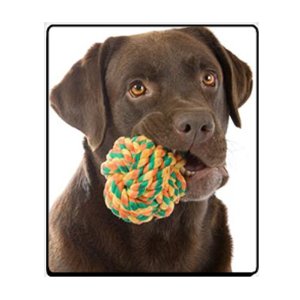There comes a time with our dogs when we have to start considering some of the effects of age on their diet. They may need different food. They may not have the same appetite they had when they were younger. They may have some dental issues. Even their eyesight can affect their eating habits. However, with some care and consideration on your part, you can help your elderly dog through some of these problems and see that she continues to get the very best nutrition possible.
For many years dog food experts maintained that older dogs should have their protein intake limited in the belief that their kidneys could not process protein very well. We now know this not to be true. It’s perfectly all right to feed your older dog good quality protein in his diet as long as he doesn’t have any pre-existing kidney problems. The key is to make sure that you are feeding a good quality food with good quality protein. Recent research indicates that older dogs may need more protein than younger dogs instead of less.
You should also look for a food that is lower in carbohydrates with moderate amounts of fat. It’s not necessary to completely eliminate fat from your senior dog’s diet. Even if your dog is a little overweight, if you completely eliminate fat from his diet you will leave your dog feeling hungry all the time which can lead to other problems. If your dog is thin (and some older dogs can have trouble keeping their weight), a little additional fat in the diet won’t hurt.
When looking for a senior dog food it’s fine to buy a commercial food but make sure you read the label carefully. Some senior foods are formulated to keep weight off senior dogs. If your dog is already thin you don’t want a dog food that will cut his calories. You may need to look for a dog food that is higher in calories. If your dog is plump you may want to get one of the senior foods that will keep his weight down since too much weight can worsen conditions like arthritis.
Many senior dogs can have some dental problems which leads them to walk away from their food. They may nibble and be unable to eat much. If your dog has trouble eating you should examine her mouth. Ask your vet to look at your dog’s teeth. It may be necessary to have a tooth pulled or to scale your dog’s teeth. Pulling a tooth or even having a root canal done can often solve the problem and your dog will be back to eating like a younger dog again.
Most older dogs also begin to experience some dulling of the senses. They no longer smell and taste things as acutely as they once did. Food is no longer as appealing to them. You can make their food more tempting by adding some tasty canned food to their dry food to make it smell and taste better. You can also do some home cooking for your dog. Most dogs like to eat whatever you’ve cooked for yourself. Things like chicken and sweet potatoes, or beef cooked to tenderness are often favorites. As long as you don’t make this home cooking more than 30 percent of his diet you won’t be upsetting the vitamin balance that he gets from his regular dog food. It’s also a good idea to wet his regular kibble with something like chicken or beef broth to make it more appealing.
Older dogs can also begin to have some eyesight problems. They may look at their feed bowls oddly at times and refuse to eat. Don’t be surprised if you have to resort to hand feeding once in a while.
You should also take your senior dog to the vet for a senior health check periodically. Your vet will be able to identify possible problems and tell you about any special things you should be doing to take care of your dog.
Just because your dog is getting older doesn’t mean she’s ready to leave you. Your older dog is merely going through some physical changes. You can help her with these changes by being watchful and trying to figure out the kind of help she needs. Let your dog’s actions and appearance guide you. You can do a lot to help her live many more happy years.
Helping Your Elderly Dog courtesy of Dog Articles.
Looking for a great gift idea? Who wouldn’t love a beautiful plate showcasing their favorite breed? Check out all of the great doggie gift ideas on Amazon.com –doggieoftheday@amazon.com









